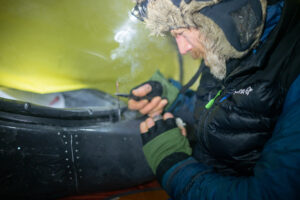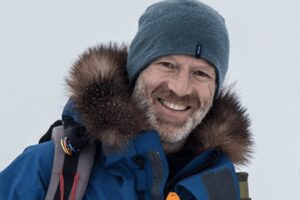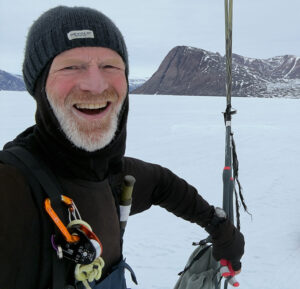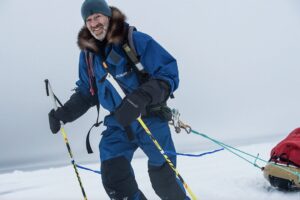The adjective “prestigious” is commonly used to describe the organization known as the Explorers Club. This is doubtless because past members have included such prestigious individuals as Sir Edmund Hillary, Roald Amundsen, Charles Lindbergh, Jane Goodall, Thor Heyerdahl, Tenzing Norgay, Peter Freuchen and Robert Peary. With respect to the last of these individuals, the Club was inaugurated in 1907 as the Arctic Club of America in order to help fund his North Pole obsession. Peary was one of its early Presidents. An earlier President was Frederick Cook, who faked both a first ascent of Mt. McKinley and a successful assault on the North Pole.

Robert Peary and Roald Amundsen
As an Arctic specialist myself, I became a member of the Explorers Club in 1990. At the time, the Club was still more or less devoted to promoting its traditional subject — actual exploration. Thus unscaled peaks, marine trenches, the recovery of shipwrecks, tropical jungles and frozen wastes were still the most significant part of its agenda. So was the study of indigenous peoples who lived off the map.

Millman’s certificate of membership in the prestigious club. Photo. Lawrence Millman
Whether an explorer’s goal is an unscaled peak, an unvisited chunk of geography or a barely contacted group of people, he or she once utilized what Winston Churchill famously referred to as “blood, sweat, toil, and tears.” Increasingly, those words have become not altogether relevant with regard to the Club’s undertakings. Individuals who’ve traveled on expensive cruises to (among other places) Antarctica are now being inducted into the Club’s roster. For they can easily pay the several hundred dollar annual dues, and having done so, they can remark, “Hey, I’m in the Explorers Club.” Gosh, you must be prestigious, their listeners might think.
The dues of such individuals, along with a costly initiation fee, provide support for a consciously upscale organization that could never be located next door to a dry cleaner in Harlem or a convenience store in the Bronx. Quite the contrary. Since 1965, the Club’s headquarters has been a posh six-story Jacobean mansion at 46 East 70th Street, on New York’s Upper East Side.
For those readers unfamiliar with the Big Apple’s geography, the Upper East Side is the preferred habitat for the city’s moneyed class, especially the CEOs of large corporations. In fact, many of the Club’s officers occupy condos on the Upper East Side. Certain members such as yours truly have suggested that Club be re-named the Upper East Side Club. Attempts to relocate the Club’s headquarters elsewhere, even to some place out of the city, have come to naught…for the same reason that you can’t relocate Wall Street.

Not the Explorers Club. The diametrical opposite, perhaps.
In keeping with its habitat, the Club has revamped itself in an effort to attract corporate sponsors, many of whom live right around the corner. To do this, the Club can’t say, “Hey, we’ve got a guy who’s searching for Thule Period Inuit sites on Jan Mayen Land.” Nor can it say, “We’ve got a gal who’s investigating giant isopods in the Marina Trench.” The potential sponsors would blink their eyes uncomprehendingly. But a sponsor would reach for his or her wallet upon hearing this utterance: “Here’s a guy who’s a genuine aerospace biochemical engineer!” As it happens, the Club recently gave one of its Lowell Thomas Awards to an aerospace biochemical engineer. (Note: Lowell Thomas was a media mogul and explorer wannabe who helped fund the purchase of the Club’s Jacobean mansion.)
Not surprisingly, perhaps, many new members of the Club are so-called techies whose idea of exploration doesn’t extend beyond their computers. “Remote sensing” seems to be one of their most favorite activities. Personally, I think scanning the earth with a satellite is considerably less interesting than scanning it with one’s eyes…or, indeed, standing on it with one’s feet. So it was that I perpetrated the following prank: I created an Abominable Snowman expert named Albert Yetti, and I proposed him for membership in the Club. He used remote sensing to locate his subject so he wouldn’t have to leave his Upper West Side digs. Mr. Yetti would have become a member if I hadn’t confessed to my crime at the last minute.
I was hardly the only person in the Club who didn’t think exploration should be synonymous with technology. Our attitude wasn’t appreciated by one of the Presidents, who vowed to drag us, he said, “kicking and screaming into the 21st century.” To my mind, this is a lot like Henry Morton Stanley’s (of Stanley & Livingston fame) positive take on having slaughtered his way across Africa in order to rescue Emin Pasha, who didn’t want to be rescued. “I opened it [Africa] to the civilizing influence of commercial enterprise,” Stanley wrote.

The Explorers Club Logo
Speaking of the 21st century, two of its better-known individuals have recently received major awards from the Explorers Club. Can you guess who they are? Climber Reinhold Messner? Arctic explorer Will Steger? Neither of the above. The individuals in question are Elon Musk, founder of PayPal as well as co-founder of Tesla, and Jeff Bezos, founder of the publisher-killing company called Amazon. Both have an interest in outer space and, consequently, the technology needed to visit it. Musk, who wants to be the first person to die on Mars, received the Explorers Club’s Presidents Award in 2014. Bezos, who has worked at recovering M-1 rocket engines, received the Buzz Aldrin Space Innovation Award in 2017. That two such techno-capitalists should be lauded was, for me, the next-to-the-last straw.
In 2017, I asked the Club whether I could give a presentation on my expeditions to various remote parts of Hudson Bay. I’d given similar presentations about my expeditions to different parts of the Arctic both in the 1990s and early 2000s, so I figured the response would be positive. How wrong I was. “You’re not an explorer,” the person in charge of events told me. If Messers Musk and Bezos are explorers, then I’m not actually an explorer. After all, I’ve made 30+ expeditions to the Arctic and Subarctic, but I have no association with Tesla Motors or Amazon, although I once did go on an expedition to the Amazon. Nor have I made a single trip, virtual or otherwise, to outer space.
This was the last straw, and I decided to let my membership in the Explorers Club lapse. In doing so, I was in good company, for Conrad Anker and Paul Theroux, among others, had also allowed their memberships to lapse. I’m now planning to join the Whiskey Explorers Club, which, mercifully, is not a prestigious organization.

Millman in the Arctic. Photo: Lawrence Millman






